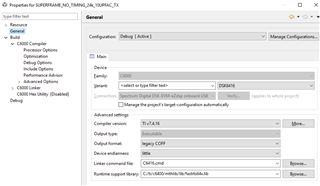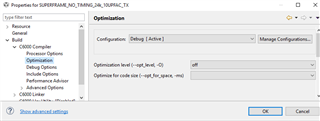Hello,
I have a question regarding optimization problem.
Here is my code:
/*Loop for correlation computation.*/
for (n1=0; n1<1400; n1++)
{
fine_sync = 0.0+0.0*I;
for (m1=0; m1<200; m1++)
{
fine_sync += mpysp(input[n1+m1],conjf(CMP_MOD_knownsym[m1]));
}
fine_sync1_vector_abs[n1]=cabsf(fine_sync);
}
My this section of code is taking about 54,000,000 cycles (54 ms) ,measured from CCS profiling tool . That cannot be afforded for any real time application. I am running this code in C6416 Chip with 1 Ghz clock.
I need help regarding optimization of this loop. The outer loop is running for 1400 times whereas, inner loop is running for 200 times.
I know about loop unrolling but that doesn't work so much. I want to know some other method through which I can reduce execution cycles of this loop.





